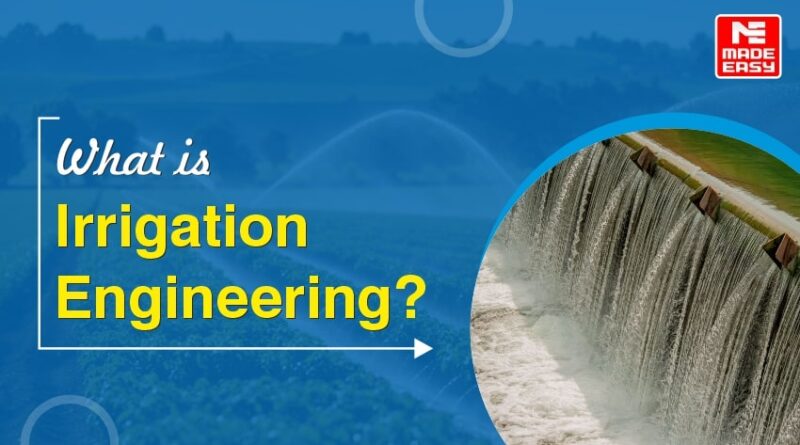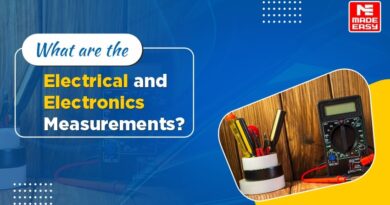What is Irrigation Engineering?
What is Irrigation in Civil Engineering?
Plants and living beings require air and water for growth and survival like human beings. The requirement of water varies depending upon the type of plant. Although water is supplied to plants by nature in the form of rainfall or through flood waters of rivers, sometimes the requirement of the plant is more than that provided by rainfall or it may happen that time of requirement of water of plant is different from time of rainfall.
In that case, water is supplied to them by artificial means and the process is known as irrigation. Irrigation may be defined as the process of artificial application of water to the soil or land for the growth of agricultural crops. In other words, it is the science of planning and designing a water supply system for the agricultural land to protect the crops from adverse effects of weather.
Given below are the links of the of the key concepts from Irrigation Engineering which will be helpful for aspiring civil engineers:
Key Concepts:
What is the scope of irrigation engineering?
Irrigation Engineering is one of the subjects in civil engineering that focuses on efficient use and management of water resources for agricultural purposes and ensures the sustainability of water supplies. The scope of irrigation engineering encompasses several key areas such as Water Resource Management, Irrigation System Design, Drainage systems, Water conservation techniques, Environmental impact assessment, Economic feasibility studies.
Irrigation engineering is essential for ensuring food security, managing water resources sustainably, and supporting the livelihoods of communities dependent on agriculture.
Why do we study irrigation engineering?
Studying irrigation is important for several reasons:
- Food security
- Water resource management
- Economic development
- Environmental protection
- Adaptation to climate change
- Technological advancements
- Policy and planning
- Global challenges
Check More Civil Engineering Links:
Online Courses for Irrigation Engineering (CE):
Civil Engineering candidates pursuing a stable career in CE can see high competition while preparing for government engineering exams such as GATE, ESE, SSC JE and many others. While government jobs bring along a stable career and job security, it is not easy to crack the exam. Government exams expect hard work, dedication and a well strategic planning and study routine. MADE EASY is here to support your preparation journey of GATE, ESE and PSU Exams. Our courses are curated by renowned experts that focus on providing quality lectures from the basic level to advanced level. MADE EASY provides aspirants the right guidance to maximize their performance and achieve success. Civil engineering candidates are advised to visit on the links given below to know more about courses that include key concepts of engineering branches taught from basic level and prepare aspirants for the future.
- GATE : 1 Year Foundation Course
- ESE+GATE : 1 Year Foundation Course
- GATE + SES (GS) : 1 Year Foundation Course
- GATE & SES (GS) 2025-26: Live Online Foundation Course
- ESE + GATE + SES (GS) 2025-26: Live Online Foundation Courses
Recommended Books for Irrigation Engineering
Books are still an essential part of learning as they offer in-depth knowledge in various topics. Learning books are well structured and provide comprehensive understanding making them invaluable for students and lifelong learners. MADE EASY Publications is one such platform for students who are looking for high quality and well structured content for their preparation. Our platform consists of government engineering exams books which are curated by a team of experts and experienced authors. Electrical engineering aspirants are suggested to click on the links mentioned below to learn more in depth about power systems:
- GATE-2025: Civil Engineering Previous Year Solved Papers
- ESE 2025: Preliminary Exam: Civil Engineering Objective Solved Paper Vol-1
- A Handbook on Civil Engineering
FAQs:
1. What are the different types of canal outlets?
Ans. Canal outlets can be classified mainly into three classes:
(a) Non modular outlets
(b) Semi-modular outlets
(c) Modular outlets
2. What are the advantages and disadvantages of canal lining?
Ans. Advantages: prevents seepage loss and hence more area can be employed for irrigation, helps in prevention of water logging.
Disadvantages: it requires heavy initial investment.
It is difficult to repair the damaged lining.
3. Why is irrigation necessary for crops?
Ans. Irrigation plays an important role for crops due to several key reasons:
- Water supply
- Crop yield increase
- Drought mitigation
- Season extension
- Soil quality maintenance
- Frost protection
- Nutrient management
- Weed control
- Temperature regulation
4. What causes waterlogging?
Ans. It is a phenomenon in which productivity of land gets attached due to rise in water table, thus leading to the flooding of the root zone of the plants . In this process, the productivity of land is affected by rise in water table.
5. What is the role of an irrigation engineer?
Ans. An irrigation engineer is expected to perform: Planning, organizing and supervising construction of dams, Supervising maintenance of dams and other buildings, Assisting Geologists and other engineers in constructing barrages, canals, tunnels, etc.





